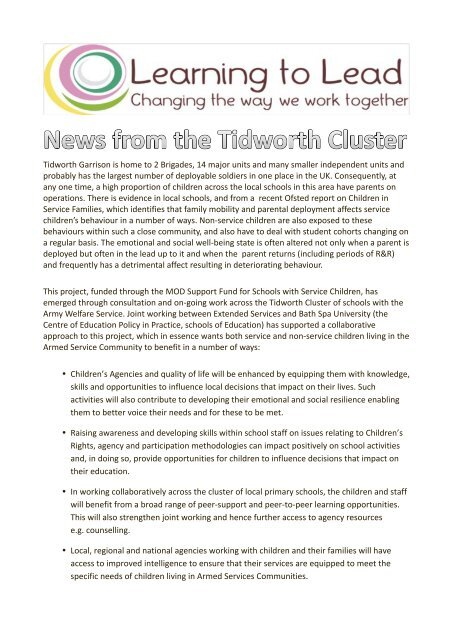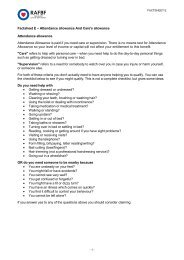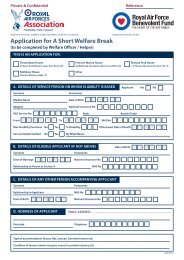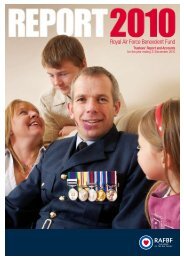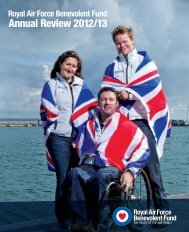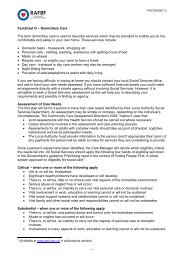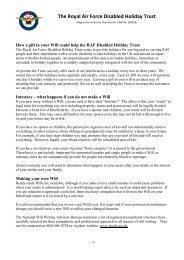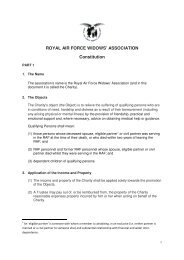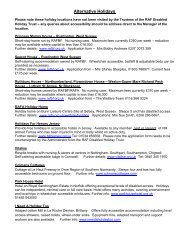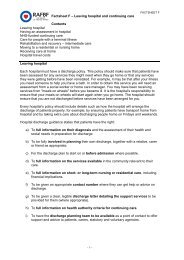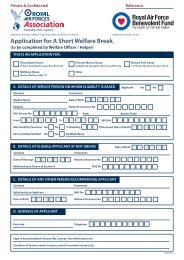Service Children Support Network - RAF Benevolent Fund
Service Children Support Network - RAF Benevolent Fund
Service Children Support Network - RAF Benevolent Fund
You also want an ePaper? Increase the reach of your titles
YUMPU automatically turns print PDFs into web optimized ePapers that Google loves.
News from the Tidworth Cluster<br />
Tidworth Garrison is home to 2 Brigades, 14 major units and many smaller independent units and<br />
probably has the largest number of deployable soldiers in one place in the UK. Consequently, at<br />
any one time, a high proportion of children across the local schools in this area have parents on<br />
operations. There is evidence in local schools, and from a recent Ofsted report on <strong>Children</strong> in<br />
<strong>Service</strong> Families, which identifies that family mobility and parental deployment affects service<br />
children’s behaviour in a number of ways. Non-service children are also exposed to these<br />
behaviours within such a close community, and also have to deal with student cohorts changing on<br />
a regular basis. The emotional and social well-being state is often altered not only when a parent is<br />
deployed but often in the lead up to it and when the parent returns (including periods of R&R)<br />
and frequently has a detrimental affect resulting in deteriorating behaviour.<br />
This project, funded through the MOD <strong>Support</strong> <strong>Fund</strong> for Schools with <strong>Service</strong> <strong>Children</strong>, has<br />
emerged through consultation and on-going work across the Tidworth Cluster of schools with the<br />
Army Welfare <strong>Service</strong>. Joint working between Extended <strong>Service</strong>s and Bath Spa University (the<br />
Centre of Education Policy in Practice, schools of Education) has supported a collaborative<br />
approach to this project, which in essence wants both service and non-service children living in the<br />
Armed <strong>Service</strong> Community to benefit in a number of ways:<br />
• <strong>Children</strong>’s Agencies and quality of life will be enhanced by equipping them with knowledge,<br />
skills and opportunities to influence local decisions that impact on their lives. Such<br />
activities will also contribute to developing their emotional and social resilience enabling<br />
them to better voice their needs and for these to be met.<br />
• Raising awareness and developing skills within school staff on issues relating to <strong>Children</strong>’s<br />
Rights, agency and participation methodologies can impact positively on school activities<br />
and, in doing so, provide opportunities for children to influence decisions that impact on<br />
their education.<br />
• In working collaboratively across the cluster of local primary schools, the children and staff<br />
will benefit from a broad range of peer-support and peer-to-peer learning opportunities.<br />
This will also strengthen joint working and hence further access to agency resources<br />
e.g. counselling.<br />
• Local, regional and national agencies working with children and their families will have<br />
access to improved intelligence to ensure that their services are equipped to meet the<br />
specific needs of children living in Armed <strong>Service</strong>s Communities.


